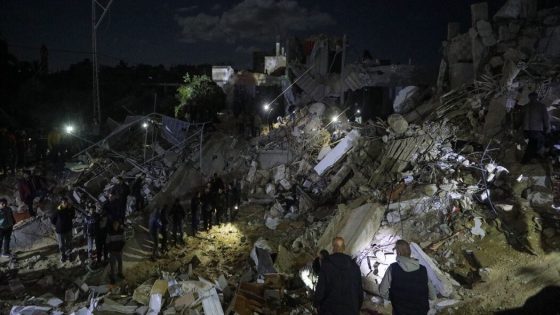The United Nations Security Council is expected to consider a draft resolution on Monday morning that “demands an immediate cease-fire for the month of Ramadan,” three diplomats said, as well as the unconditional release of hostages held in Gaza, just days after a resolution from the United States failed following vetoes from Russia and China.
The latest resolution, put forth by 10 countries, explicitly demands a truce during Ramadan while also calling for the “immediate and unconditional” release of the more than 100 hostages still held captive in Gaza, according to a draft seen by The New York Times. The language of the proposal was still being negotiated, however, and could change before it is advanced to a vote.
The proposed resolution was jointly sponsored by Algeria, Ecuador, Guyana, Japan, Malta, Mozambique, South Korea, Sierra Leone, Slovenia and Switzerland. Algeria also voted against the U.S.-backed cease-fire resolution on Friday, saying it did not go far enough, while Guyana abstained.
It was not immediately clear whether the new draft would pass the Security Council, nor whether it had American support. But China’s Foreign Ministry said Monday that it would back the resolution, removing one potential obstacle.
“The draft clearly calls for a cease-fire and expanded humanitarian relief in Gaza, which is in line with the correct direction of the Security Council’s actions,” Lin Jian, the Chinese foreign ministry spokesman, told reporters. He added: “It is hoped that the Security Council will send a strong signal for a cease-fire and an end to the war as soon as possible.”
Roughly 1,200 people were killed and 250 taken hostage in the Hamas-led attack on Israel on Oct. 7, according to Israeli authorities, prompting Israel to launch its blistering offensive in Gaza. The holy month of Ramadan is about at its midpoint, and is scheduled to end around April 9.
The draft uses stronger language than the failed U.S.-backed resolution, which critics had slammed for not explicitly calling for an immediate halt to the fighting.
The new resolution straightforwardly demands an immediate halt to hostilities. The American proposal had stated that the Council “determines the imperative of an immediate and sustained cease-fire to protect civilians on all sides,” while “using the window of opportunity” to create the conditions for a “sustainable cessation of hostilities.”
The U.S.-backed draft resolution also extensively condemned Hamas’s Oct. 7 attack and called for U.N. member states to restrict funding to the Palestinian armed group. The new draft is far more concise and instead generally deplores ”all attacks against civilians” and “all acts of terrorism,” specifically singling out the taking of hostages.
The Biden administration has wielded its veto power multiple times since the beginning of the Israel-Hamas war to foreclose cease-fire resolutions in the Security Council, raising international ire. On Friday, eleven members voted in favor of the resolution, but Russia and China — permanent members — vetoed it, dooming the proposal.
On Monday, António Guterres, the U.N. Secretary General, said the international community increasingly supported a cease-fire so as to stop “the collective punishment of the Palestinian people that is causing such an immense tragedy in Gaza.”
“Even in countries that are friends and allies of Israel, I see a consensus emerging that this war must stop,” Mr. Guterres said during a visit to Jordan, while reiterating his call for the release of hostages held in Gaza.
Amy Chang Chien contributed reporting from Taipei, Taiwan.
Source Agencies



